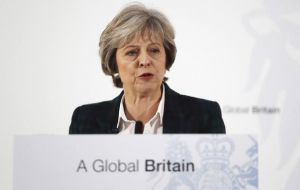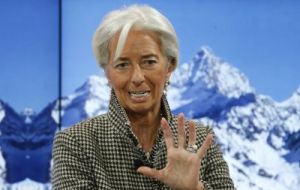MercoPress. South Atlantic News Agency
Lagarde anticipates “pain” as UK prepares departure from the European Union
 Lagarde welcomed PM May speech on Tuesday saying that Britain wanted to leave the single market, for providing clarity.
Lagarde welcomed PM May speech on Tuesday saying that Britain wanted to leave the single market, for providing clarity.  “Better clarity, less uncertainty is certainly better for the UK economy and for the rest of the EU,” she said. But still many questions have to be answered.
“Better clarity, less uncertainty is certainly better for the UK economy and for the rest of the EU,” she said. But still many questions have to be answered. The head of the International Monetary Fund has warned the UK there is still likely to be “pain” ahead as Theresa May prepares to trigger the UK's departure from the European Union. Christine Lagarde told the BBC the Brexit process would be complicated.
Lagarde said that although the UK economy had performed more strongly than the IMF had predicted, uncertainty over the terms of the deal “is always a risk”. Any deal with the EU will “not be as good” as membership.
“When you belong to a club, whatever that is, the members of the club have a degree of affinity and particular terms under which they operate,” Ms Lagarde said at the World Economic Forum in Davos. “Someone outside the club has different access.”
Asked if she agreed with the Prime Minister of Malta, Joseph Muscat, that any future UK/EU agreement “necessarily needs to be inferior to membership”. Malta presently holds the rotating presidency of the EU.
“If being part of a club is optimizing and leveraging your membership [leaving the club] would not be as good, yes,” she said.
Ms Lagarde welcomed the prime minister's speech on Tuesday - saying that Britain wanted to leave the single market - for providing clarity. “Better clarity, less uncertainty is certainly better for the UK economy and for the rest of the European Union,” she said. But she warned that there were still many questions to be answered.
“The terms under which the [agreement] will be facilitated, over what period of time - question mark,” she said. “Over what kind of transition period - question mark.”It is only when those questions are better clarified that we will understand how the UK economy is going to pan out.
“We are still of the view that it will not be positive all along and without pain.”
Before the referendum result, Ms Lagarde said a vote to leave the EU would have consequences ranging from “quite bad to very, very bad”. Since the referendum, the UK economy has performed strongly and the IMF has admitted that it was too pessimistic.
Earlier this week, the IMF upgraded Britain's growth forecast for 2017. However, once uncertainty clears and if people feel that their ability to set up shop in the UK and their ability to operate throughout the geographical area that is the European Union is not working as well as it did, “the investment decision will change”, forecasted the IMF chief..




Top Comments
Disclaimer & comment rules-

-

-

Read all commentsThe same Christine Lagarde who predicted dire consequences if the people of Britain dared to vote to leave the EU. I note she is being a bit more cautious with her current comments. Where does she get that year-round tan? She must spend a lot of time out of Washington DC - because it certainly isn't very warm or sunny there at present.
Jan 19th, 2017 - 11:20 am 0Is that the same Lagarde?
Jan 19th, 2017 - 05:36 pm 0The depth, breadth and scope of London will ensure is continues to remain a considerable financial hub. Likely will again lose its #1 ranking status behind New York, but maybe just for a while :)
1000 jobs moving from UK to EU is just corporate positioning to retain access to both markets, but retaining a predominant UK based domicile structure for the economic/geopolitical structure, tax and regulatory benefits that brings. Not unreasonably some existing EU financials might move comparable or possibly more in the opposite direction (in order to retain access to the UK).
If HSBC move 1000 and a similar number from UBS, and JP Morgan and Goldman Sachs move fewer than 7000 combined, you're looking at less than 10,000 in total from across 4 major players with 250,000 current in the UK, around 4%. Many of which are EU workers already that were moved to the UK. In comparison to the 1M more workers that might be required due to less regulatory (UK Brexit) and lower taxes (potential for the UK to perhaps cut corporate tax to 10% or less) and 10,000 fades into insignificance. Let alone existing EU based desks being moved from the EU into London/UK in order to maintain 'access' to the UK and the global trade partnerships that provides.
Obviously the EU will in time lock out London as much as possible from being the EU's financial lungs. To its own economic detriment, not that that has bothered it in the past
Lagarde anticipates
Jan 20th, 2017 - 08:57 pm 0Another crooked weasel and anti brit,
we will do ok thanks, and the unmighty EU will surely regret the threats and intimidation,
they would be better of making a fair deal and be friends,
rather than punishment that will inevitably backfire.
Commenting for this story is now closed.
If you have a Facebook account, become a fan and comment on our Facebook Page!